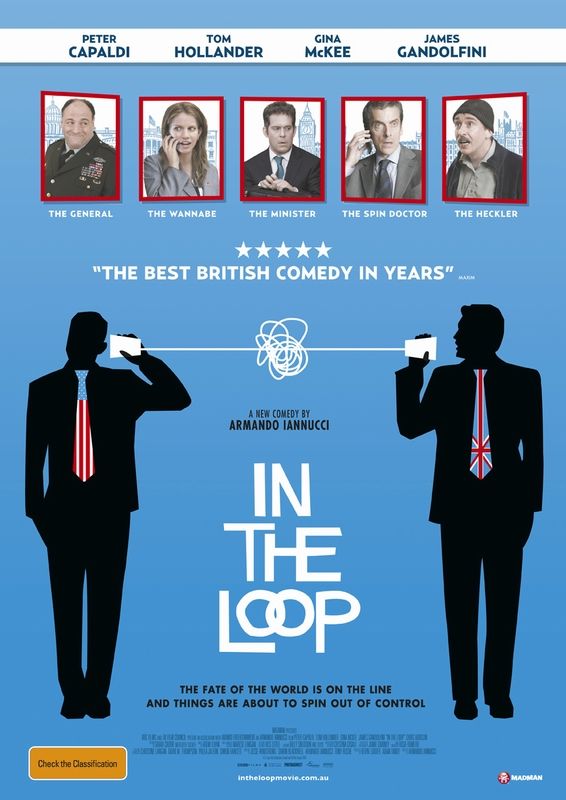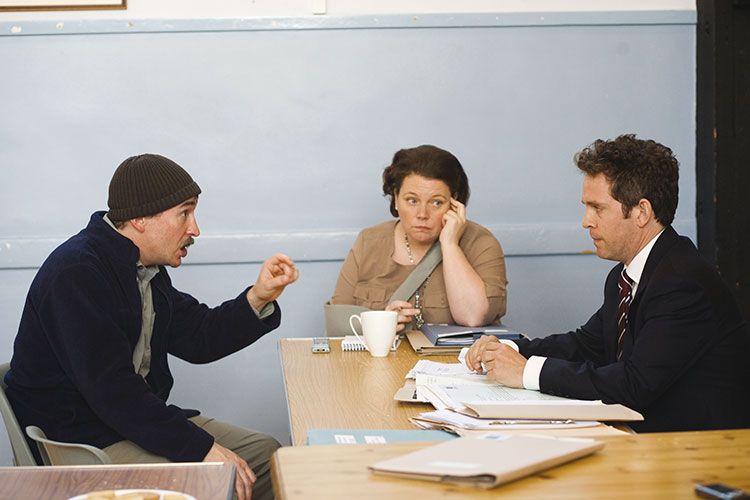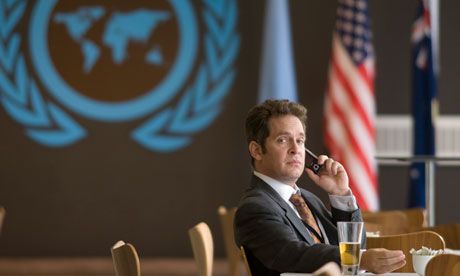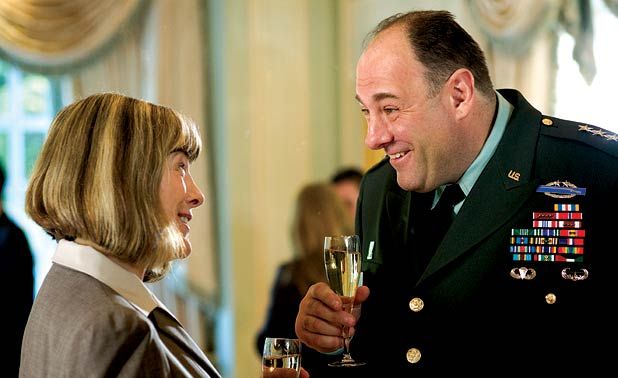I am not a Whovian, but yesterday I got to watch all my Whovian internet friends explode with the announcement of the casting of Twelve. And then I realized that I have a review for one of Twelve's films! So congratulations, Peter Capaldi, you get a special post today!
In
the Loop
2009
Director: Armando Iannucci
Starring: Tom Hollander, Peter Capaldi,
Mimi Kennedy, Chris Addison, Anna Chlumsky, David Rasche, James Gandolfini
My
dad likes to tell a story about when I was young and couldn’t sleep. He’s always been a night owl, and when I was
but a wee Siobhan, three years old or so, and couldn’t sleep, he’d stay up with
me, and more often than not, he’d turn the television to PBS. That late at night, PBS wasn’t running
children’s programming. No, we’d watch
whatever British comedy happened to be on.
My father likes to tell people how he was scared when, as a three year
old, I’d be laughing at all the right places during an episode of Monty Python. With such an upbringing, it’s not too much of
a wonder that classic Britcoms have been with me for a long, long time. I mention this because I’ve always found
British comedies funnier than many American comedies, and In the Loop is no
exception. Thing is, though, I think
it’s even better than many of its own ilk because it takes the dry wit and
black humor and scathingly applies it to the current political climate, a
landscape that desperately needs some skewering.
Malcolm
Tucker (Capaldi) is a foul-mouthed and ruthless director of PR for the British
Prime Minister who has his hands full with slightly dense elected official
Simon Foster (Hollander). The problem is that Foster hasn’t toed party lines
when it comes to the government’s pro-war position for the impending Middle
East conflict, having unintentionally given the press an anti-war sound
bite. Things get even more confusing
when Foster tries to backpedal but instead ends up providing yet another
unintentional sound bite, but this time it’s pro-war, and Foster’s new
assistant Toby (Addison) is put in charge of handling the situation. American politicians jump all over Foster’s
comments on both sides, trying to leverage him as British support for their
arguments. This includes Karen Clark
(Kennedy), an anti-war politician, and her assistant Liza (Chlumsky), as well
as Linton Barwick (Rasche), who wants war at all costs.
Before
getting into the massive political commentary rife throughout In
the Loop, I’d like to state that this is the funniest movie I’ve seen
in a long, long time. I find a great
deal of things funny, but I tend not to laugh out loud all that often. Sometimes my husband thinks something is
wrong; we’ll be watching an amusing show, he’ll look over after a good joke and
ask, “Why aren’t you laughing?” Just
because I don’t laugh at something doesn’t mean I don’t find it very
funny. I mention this because when
something actually DOES make me laugh out loud, it means I think it’s
positively hysterical. And I was
laughing out loud throughout almost the entirety of In the Loop. I’m not entirely sure why I’m wired that way,
and why so little comedy manages to elicit belly-laughs from me, but I do know
that when I come across something that DOES (which, by the way, more often than
not is British comedy), I latch onto it like crazy, and I know it’s a good thing.
Mostly
improvised from script outlines, the dialogue is rip-roaringly funny. Akin to a British political version of
Christopher Guest’s Best in Show, I am always staggered by the skill of people who
can make up such incredibly funny lines on the spot. When an angry Scot says of opera “It’s just
vowels! Foreign, subsidized vowels!” I
lost it. A particular favorite was
“Difficult, difficult, lemon difficult,” a line which, admittedly, out of
context, probably doesn’t come across as that funny, but one that almost had me
falling out of my chair when I first heard it in the film, and then when it was
later repeated I almost peed myself.
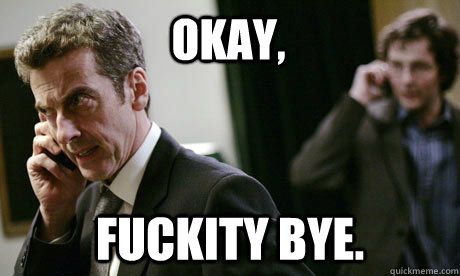 |
| I cannot tell you how badly I want this to be Twelve's catchphrase. |
And
bringing up more of the comedy, one of my other favorite lines was when Malcolm
ended a phone call by yelling “Fuckity bye!”
In the Loop has some of the most creative vulgarities I believe
I have ever heard. F-bombs are dropped
nearly every other sentence – heck, sometimes, every other word, but it’s not
just about the swearing. Such massively
unique insults are hurled with lightning reflexes, it’s hard not to be
impressed. Every character has someone
they intensely dislike, and a great deal of the exchanges in the film are these
people simply tearing one another down.
It would be sad and maybe a bit depressing but for the fact that it’s
more than clear that every character has immensely thick skin and knows how to
let these barbs simply run off their back.
Fuckity bye!
Alright,
so In
the Loop is the funniest movie I’ve seen since Borat, the film that had me
reaching for an oxygen tank. But when
that comedy is used to make frightening political commentary, then we’ve really
got something. Just like Borat
uses its humor to tear down America’s conception of itself, In
the Loop rips the political world to shreds. The entire plot is about whether or not a war
will be started, but all the action takes place in the world of politics. It’s only mentioned once or twice that the
war in question will take place in the Middle East, which underlines the point
that this war is not about the enemy. No
reason for the war is ever given – EVER – which makes the point that this war
is not about a valid motive. But we are
constantly given politicians politicking, which means that the grey, unnamed
war in In the Loop is entirely and only about politics and people in
suit, miles away from any kind of actual conflict.
And
what’s truly frightening is that this philosophy feels barely removed from the
truth. In the Loop is deathly
funny, but also more than a bit scary because it strikes far too close for
comfort. The sort of unintelligent
double speak, where politicians manage to talk endlessly while saying nothing
at all, is all too much of a reality.
The behind-the-scenes wrangling, where minutes of meetings are shamelessly
altered, where articles are rewritten to only present pro-war arguments, are
stomach-churning in how conniving they are, but the scary thing is it feels all
too possible. Is this what politics is
really like? As sad as it is, I could
buy In
the Loop as a documentary, a world where no character is pure, where
every character is backstabbing and has their own ulterior motives, where each
side is ridiculous in their faults.
There are no heroes in In the Loop, but there are many
villains.
In
the Loop
is funny, biting, and incisively clever.
Like I said, I rarely laugh out loud at comedies, but I did here, and by
the end of the film, it had definitely become a bit of laughing and crying
mixed together. In the Loop is smart,
very smart, and it’s a little sad, if not wholly unsurprising, that I had never
even heard of it except for its presence in 1001 Movies. It’s too easy to understand why it didn’t get
enough press in America to make its way onto my radar.
I
now want to end all of my phone conversations with “Fuckity bye!”
Arbitrary
Rating: 9/10
